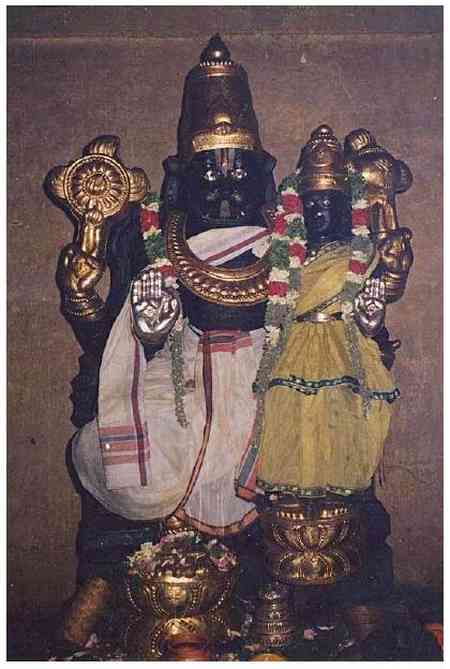
10. பிபேதி பவப்ருத் ப்ரபோ தவத் உபதேச தீவ்ர ஔஷதாத்
கதத்வ ரஸ துர்விஷே பளிச பக்ஷவத் ப்ரீயதே
அபத்த்ய பரிகாரதி விமுகம் இத்தம் ஆகஸ்மிகீ
தம அபி அவஸரே க்ரமா தவதி வத்ஸலா த்வத் தயாBhibhEth bhavabhruth PrabhO thvadhupadEsa theevroushadhAth
kadadhva rasa dhurvishE BaLisa bakshavath preeyathE
apaTya parihAra- dhee vimukham ittham Aakasmikee
tamapyavasarE kramaa dhavathi Vathsalaa Thvadh-dhayaa
பொருள் – ஸ்ரீரங்கநாதா! ஸம்ஸாரத்தில் உழன்றபடி உள்ள மனிதன், கசப்பான மருந்து போன்ற உனது உபதேசத்தைக் கண்டு அச்சம் கொள்கிறான். தூண்டிலில் வைக்கப்பட்ட உணவைக் கண்டு மகிழும் மீன் போன்று, தவறாகப் பெறப்படும் விஷம் போன்ற சுவையை எண்ணி மகிழ்கிறான். இப்படியாக அவன் தனது தீய செயல்களில் இருந்து விலகுவதற்குச் சிறிதும் எண்ணுவதில்லை. இப்படிப்பட்ட அவனைக் கூட – என்ன காரணம் என்று அறிய இயலாமலும், சரியான காலத்தில் தோன்றியதும் ஆகிய உன்னுடைய தயை குணமானது காத்து நிற்கிறது.
Meaning:
Swamy Desikan says here: “Tamapi Vathsalaa aakasmikee Thvaddh Dayaa, avasarE kramAth avathy”. Even him (the samsaari lost in the enjoyment of the transient pleasures of life), Oh RanganAthA, Your avyAja karuNA saves him in due time from repeated births and deaths.
Oh Lord of Srirangam! The SamsAri (Bhavabhruth) fears (BhibEth) to take the tough medicine (theevra Oushadham) of your upadEsams in Bhagavath Saasthrams like PaancharAthram and Bhagavath Gitaa. They are the powerful medicines to cure the disease of SamsAram for the ChEtanams.
The SamsAri engages in the lowly (kadhadhva) pleasures of material life, which are like the poisonous bait (Rasa dhurvisham) that tempt the fish to feed on it (BaLisa bhakshavath) and the SamsAri is very happy (preeyathE) with that kind of enjoyment.
Being used to the tasting of such pernicious pleasures, the SamsAri is habituated (addicted) and delves deeper and deeper in such harmful activities. These acts of the SamsAri are like the fish arriving to eat the poisonous food attached to the bait of a fisherman. The fish does not realize that the biting of the bait will end its life. The SamsAri does not pay any attention to the dangers inherent in pursuit of such harmful acts of chasing after dangerous pleasures. The SamsAri has no intention to get away from such harmful (ittham apaTyam) enjoyment and keeps on engaging in such activities without casting it aside. He becomes “ParihAra dhee vimukhan” (One who is uninterested in giving up those destructive acts). What is to become of this samsAri? Who will intervene and save him from his own destructive activities?
The Lord of Srirangam does intervene. Even in the case of such a samsAri persisting in being mired in such harmful activities (tamm api), He intervenes at the appropriate time (avasarE) and gradually (kramAth) saves him (avathy) out of his infinite avyAja dayaa (aakasmikee) and affection (vathsalaa /Dayaa).
Sri RangaNathan’s KaruNaa is without any reason and is kindled by his affection for the SamsAri. Lord’s compassion admixed with His affection saves the pitiable samsAri. How is that done? The Lord’s affection makes Him overlook the trespasses of the SamsAri. The Lord’s Dayaa proceeds to wipe away the sufferings of the SamsAri. When the SamsAri gains a little PuNyam thru some act of his, Lord’s Dayaa flows towards him (SamsAri) in a manner that is not readily comprehended by others (aakasmikee Thvath Dayaa). Over time (KramAth), it turns the chEtanan towards the performance of auspicious deeds and lands him ultimately at the sacred feet of His (Lord’s) AchAryAs to perform Prapatthi and earn Moksha Sukham as a result. Sri RanganAthan’s Vaathsalyam and Dayaa thus protects the erring chEtanam in a grand manner.
In the next slOkam, Swamy Desikan wonders as to why the Lord of Srirangam, who is totally fearlesss from anything and anybody, carries weapons like Chakram, Sword, Mace and bow. Swamy Desikan gives next the answer to his own question.
Source:








